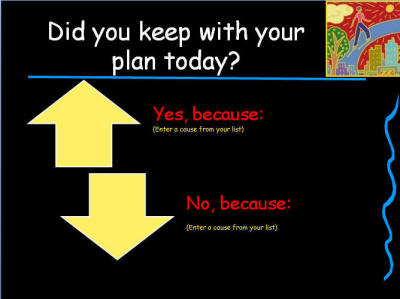|
|
This lecture introduces you to causal analysis of your
behavior. If you are trying to exercise, you can use an online database to
track the causes of exercise. If not, you should keep track of the
behavior you are trying to change and for each instance of succeeding or failing
to accomplish your goal you should list its causes and constraints.
- Distinguish causes from reasons, goals, motivation and other
concepts
- Critically evaluate a list of possible causes
- Collect data on causes and start a causal diary
- Chapter
3 "What is a cause?" in Steven Sloman's "How people think about the world and its alternatives."
Published by Oxford
University Press, 2005.
- Lecture on "What is a cause?"
Slides►
Slides 2003►
Listen►
SWF►
Advanced learners like you, often need different ways of understanding a topic. Reading is just one way of understanding. Another way is through writing about what you have
read. The enclosed assessment is designed to get you to think more about the concepts taught in this session.
- What is a counterfactual and how would we know that a causal
statement follows this criteria.
- Why is it wrong to list my spouse as the cause of my exercise?
- List criteria that all causes must meet to be recognized as a cause.
- If two events co-occur, can we assume that one causes the other?
If not, what else is needed before we can make this assumption?
- Could my medication be considered cause of my weight gain?
Could my commute be considered the cause of my weight gain? In
each instance support your answer by which of the criteria needed for a
cause is violated or supported if we make these inferences.
- A person wakes up early and does not exercise because of a phone
call. If this person says that they would have exercised if it
were not for the call, is it correct to assume that waking up early
might be a cause of exercise?
- Can a cause be always present while the effect occurs sometimes --
give an example.
-
Every week ask a question
or comment on the lecture.
Comment► Ask►
-
List the causes and constraints affecting your
personal improvement effort in the last week. Make sure that
you go back enough so that you can list at least three causes and
three constraints. Here is a sample table you can use to list
the possible causes of your behavior:
| Constraints |
Date
Added |
Causes |
Date
Added |
| 1. |
|
1. |
|
| 2. |
|
2. |
|
| 3. |
|
3. |
|
| 4. |
|
4. |
|
| 5. |
|
5. |
|
Figure 2: Sample List of Causes and Constraints
-
For each item you have listed show how the cause
or the constraint
meets the following criteria:

Figure 1: Criteria Used to Evaluate a Cause
-
Start collecting causes of your behavior.
Every time you measure your success, indicate which of the causes
listed as response to question 2 are present. Every time you
fail to keep with your plans, indicate which in your list of causes
and constraints affected your behavior. If you run into a
cause not previously listed add it to your list of Causes and
Constraints. Use the following diary page to maintain
your data. Retrospectively recall the causes of your behavior
for the past 7 days and send your diary pages for these days to the
instructor. Here is an example of a diary page that you can
recreate for yourself, though we do not show it in Figure 3, please
do not forget to provide a place for the date of the entry.

Figure 3: Sample Diary Page
Send responses to question 2 through 4 to the instructor.
Email►
- Emotion may not be the cause of our behavior
PubMed►
- Causal attributions
PubMed►
- The structure of the causal attribution belief network of patients
with obesity
PubMed►
- The structure of beliefs about the causes of heart attacks
PubMed►
This page is part of the course on
Lifestyle Management This page was last edited on
10/22/11 by Farrokh Alemi, Ph.D ©Copyright protected.
|